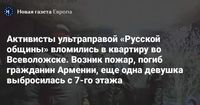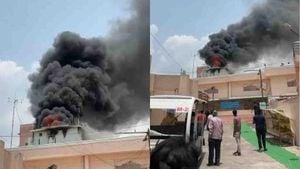On the evening of May 3, 2025, a tragic incident unfolded in Vsevolozhsk, a town in the Leningrad region of Russia, culminating in a fire that claimed the life of a 37-year-old Armenian man and left a 24-year-old woman hospitalized after jumping from a seventh-floor window in an attempt to escape. The fire broke out in an apartment on Leningradskaya Street, following a chaotic confrontation involving members of the ultra-right Russian Community organization.
According to reports from various news outlets, including Fontanka and Moika78, the sequence of events began when four to five masked individuals, identifying themselves as police, forcibly entered the apartment. The owner of the apartment later revealed that her son had called her to report the break-in, describing the intruders as men in black clothing with insignia associated with the Russian Community.
Upon arrival, the owner witnessed her son, who was reportedly in the apartment with two acquaintances, being assaulted with pepper spray and a stun gun by the intruders. He had barricaded himself in a bathroom while the others attempted to shield themselves in a separate room. It was during this tumultuous encounter that the fire ignited, although the exact cause remains unclear.
Emergency services were alerted to the fire shortly before midnight, and firefighters managed to extinguish the blaze by 12:35 AM. In the aftermath, they discovered the body of the deceased man inside the apartment, while the woman, who had jumped to escape, sustained serious injuries including head trauma, spinal fractures, and burns.
The Investigative Committee of the Leningrad Region has since opened a criminal case under two articles: causing death by negligence and illegal entry into a dwelling. The incident has drawn widespread attention, particularly due to the involvement of the Russian Community, a nationalist group known for its controversial actions against migrant workers and events it deems contrary to traditional values.
The Russian Community has publicly acknowledged its members' presence at the scene, claiming they were there to assist the apartment owner, who allegedly feared for her safety due to her brother’s behavior, as he was reportedly a drug addict. The organization stated that they acted in self-defense when her brother attacked them with a frying pan.
In their account, members of the Russian Community assert that they had been called to the apartment in response to complaints from other residents about loud disturbances and potential drug use within the premises. They described the evening as a "narcotic night of horrors," with cries for help echoing from the apartment.
However, the narrative provided by the Russian Community has been met with skepticism. Critics, including journalist Ksenia Sobchak, have demanded a thorough investigation into the actions of the group, questioning why civilians were intervening in what appeared to be a police matter. Sobchak emphasized that the group’s self-appointed role as enforcers of justice raises serious legal and ethical concerns.
Witnesses reported that the fire erupted in the room where the two guests were hiding, and it quickly spread, making it impossible for anyone inside to escape through the front door. The woman who leaped from the window was later found by emergency responders, and her injuries were severe enough to require immediate hospitalization.
As investigations continue, both the Russian Community and the authorities are under scrutiny. The organization has claimed that their actions were sanctioned by the apartment owner, further complicating the narrative of the incident. They have provided video evidence to support their version of events, but skepticism remains regarding their intentions and the legality of their actions.
The fire, which spread over an area of 26.5 square meters, was classified by the Ministry of Emergency Situations as a technological incident, suggesting that the circumstances surrounding it were complex and potentially preventable. The tragic outcome has sparked a broader discussion about community policing, the role of nationalist organizations, and the safety of vulnerable individuals in domestic situations.
As the legal proceedings unfold, the local community grapples with the implications of this incident. The Russian Community's involvement in such a volatile situation raises questions about the appropriateness of self-policing and the responsibilities of individuals when addressing suspected criminal activity.
While the investigation into the fire and the events leading up to it continues, the tragic loss of life serves as a stark reminder of the potential consequences of vigilante justice and the urgent need for effective law enforcement response in situations of domestic violence and drug abuse.
In the wake of this incident, local authorities are likely to face increased pressure to ensure that such tragedies do not recur. The balance between community safety and individual rights remains a contentious issue, particularly in areas where nationalist sentiments are on the rise.





